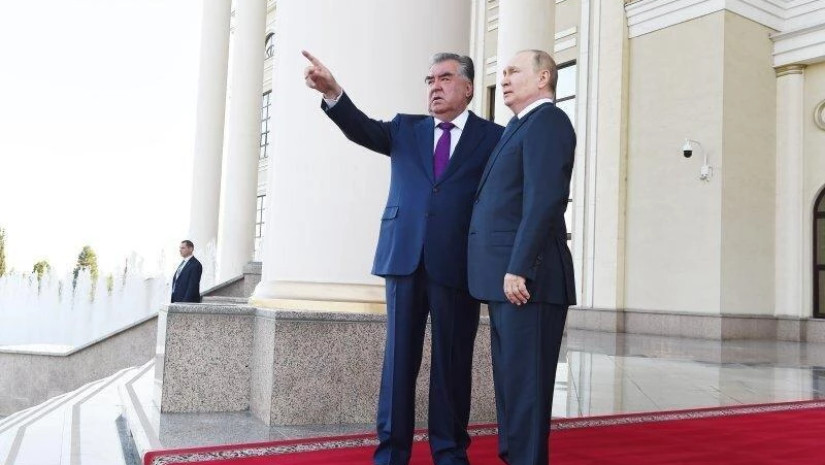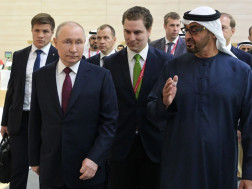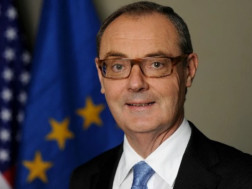For his first trip abroad since he sent his country’s armed forces into Ukraine in February, Russian President Vladimir Putin chose Tajikistan.
And few are entirely certain why.
The official agenda for Putin’s June 28 working visit sounded mostly unexceptional.
The Kremlin said in a pre-trip statement that talks with Tajik President Emomali Rahmon would dwell on the strategic alliance between Moscow and Dushanbe and on the situation in Afghanistan. No details were provided. Yury Ushakov, an advisor to Putin on foreign affairs, said that Russia would again try to make the case for Tajikistan joining the Moscow-led Eurasia Economic Union trading bloc. That too is nothing new, however.
RFE/RL’s Tajik service, Radioi Ozodi, speculated that some other, more delicate, topics might be discussed. The broadcaster noted that Putin and Rahmon were to meet one-on-one, a format suggesting the discussion would wade into sensitive areas.
These hypothetical agenda items included the “internal situation” in Tajikistan, possible assistance Dushanbe could offer Moscow in avoiding the full impact of Western sanctions, the need for Rahmon to come to terms with Taliban rule in neighboring Afghanistan, and the fraught question of the succession process.
Those explanations certainly feel more intriguing and compelling, seeing as Tajikistan is a relatively second-tier partner for Russia in most other respects.
Nevertheless, the presidents did try to sell a story about booming relations. Bilateral trade in the first five months of 2022 saw a 46.2 percent year-on-year increase compared to the same period in 2021, they noted. An investment forum scheduled to take place in Dushanbe in September should build on that, Rahmon’s office said.
Russia is expanding its presence in other ways too, through the building of schools. Five new Russian-language schools built with funding from Moscow are set to open in September.
But the specter of a rapid collapse in Russian prosperity caused by the sanctions threatens both the economic and cultural angles of this relationship. The World Bank estimates that remittances sent home by Tajik migrant laborers, the vast bulk of whom usually go to Russia for work, may plunge by 40 percent in 2022. This may cause the Tajik economy to contract by 2 percent, the bank says.
Russia-sourced remittances have long been a lifeline for Tajikistan’s wildly corrupt and inept rulers as they enable the population to just about keep their heads above water. One of the many downsides to this model, though, is that it gives Russia powerful leverage to influence domestic affairs in Tajikistan, since the Kremlin always reserves the right to close its borders to Tajik laborers. It has often made veiled threats to follow through on that possibility.
Moscow casts itself as the indispensable partner in other ways. Russia’s 201st military base in Tajikistan, spread across the cities of Dushanbe and Bokhtar, is the largest it has anywhere outside its own borders. Regular joint military exercises with Tajik forces are intended to drive home the message that if push comes to shove and dangerous elements from the south decide to pour across the border, Russian forces will hold them back.
And yet, events in Ukraine have dangerously strained this narrative. The powerful Russian army has proven something of a paper tiger prone to relying on atrocities when fighting mobile and highly motivated opponents.
The United States is trying to position itself as a viable alternative to Russia as a security guarantor – a fact underscored by a visit to Tajikistan last week from U.S. Army General Michael Kurilla, who was appointed head of U.S. Central Command in April.
“Our security assistance [in Tajikistan] focuses primarily on providing the training, equipment, and infrastructure to defend the border. Over the past four years, CENTCOM’s [assistance] include[d] ground sensors for the Tajik border guards. We’ve also provided all communication equipment used along the border, to include 4,800 radios. We’ve given Tajikistan more than 400 patrol vehicles,” Kurilla told reporters while in Tajikistan. “This assistance will continue. I am committed to Tajik sovereignty.”
The U.S. Embassy in Dushanbe will soon also oversee work on new Tajik-Afghan border outpost.
“This is just one example of security-sector assistance to Tajikistan,” Kurilla said. “Here’s another: CENTCOM provided all of the communication equipment used by Tajik security forces along the Afghan border.”
What is more, Washington has no expectations that Tajikistan will take a conciliatory position to Afghanistan in its current form.
Russia, meanwhile, is inching toward granting the Taliban regime something akin to recognition. Tajikistan is the strongest holdout against the Taliban among Russia’s close allies in Central Asia and has spoken harshly against the Taliban’s perceived hostility to ethnic minority groups, most notably the Tajiks.
Putin tried to offer Rahmon some reassurance on this front by assuring him that any dialogue with the Taliban government would require it to acknowledge Afghanistan’s ethnic diversity.
“We are attempting to build relations with the political forces that control the situation,” Putin was quoted as saying by The Associated Press. “We are working from the premise that all ethnic groups in Afghanistan, as was already said, must properly participate in running the country.”
Security and economic stability may be secondary concerns to the Rahmon regime, however.
Many observers believe that the priority for the portly 69-year-old Tajik president is to see his kleptocratic family retain power, and the wealth that comes with it, and for this to happen by means of his 34-year-old son, Rustam Emomali, taking over the reins.
That process neared completion in April 2020, when Emomali was elected speaker of the upper house of parliament, in effect placing him in pole position to take over from his father, who has run the country since the early 1990s. In taking over that job, he displaced Mahmadsaid Ubaidulloev, a veteran associate of Rahmon long known to have been a favorite of the Russian government.
There was speculation Emomali might even run in the October 2020 election, but that notion was scotched when his father confirmed that he was standing one more time.
It is a widely held article of faith that such is the residual influence of Russia, any handover would, in any event, need the blessing of the Kremlin. If Putin has granted that sought-after approval, a changeover in Tajikistan may be imminent and the sense of this otherwise uneventful trip may become clearer.
Source: Eurasianet
















